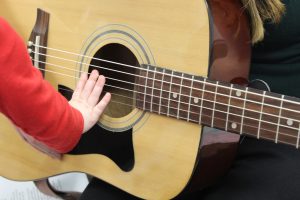Chances are, if you have found this post you may have heard of music therapy. That is great! As music therapists we are very passionate about what we do and how it can be effective for people of all ages and abilities! If you would like to know more, please follow the link here to learn more. Today we are going to dive into a specific population or group of people and how music therapy is often effective for them! We are going to talk about Autism.
Autism also know as Autism Spectrum Disorder or ASD. A child or adult with Autism may have some delay to any varying degree of social skills, and speech skills in addition to varying sensory needs and sensitivities. Here is an example of how we would address the following,
Social Delay- This can vary from reflecting on the lyrics of a song to bring the client into a greater awareness of how others feel and express themselves to simply making and maintaining eye contact.
Speech Delay- Speech delays can range from entirely nonverbal to a stutter or using mostly abbreviated phrases. A music therapist can utilize rhythmic techniques to improve stuttering and song analysis to increase developmentally appropriate complex speech.
Sensory Needs- Like most aspects of this topic sensory needs also fall on a spectrum. What we often see is the ability to regulate sensory needs or the struggle to do so. For instance, if you are in a room where there is a sound or light which you find irritating or distracting… what do you do? Well, more than likely you may try to turn off the sound or light and if you can’t, then you may choose to leave. Many people with ASD not only are more sensitive than most people to sound, touch, light, etc. But when a sensory overload starts to happen they may not have the coping skills necessary to alleviate the problem. This is often where we see misplaced behaviors.
That being said, as music therapists we have a special perspective and influence when it comes to sensory needs. Music therapy utilizes varied techniques to cater to sensory needs while creating a great environment for increasing and improving speech, social skills, academic skills, life skills, and more. I often get asked “but isn’t music therapy loud?” No, not in many cases it truly depends of what is best for our client. As music therapy we practice an understanding of sensory needs practical for many different clients. We are aware that clients can be sensitive and are kind and gentle when finding volumes, instruments, and timbres of preference.
Are you interested in music therapy for you or someone you know?
Here are a few resources on Autism and music therapy,
American Music Therapy Association on Music Therapy and Autism
If you have any questions, contact us at info@musictherapyconnections.org.
-AH




